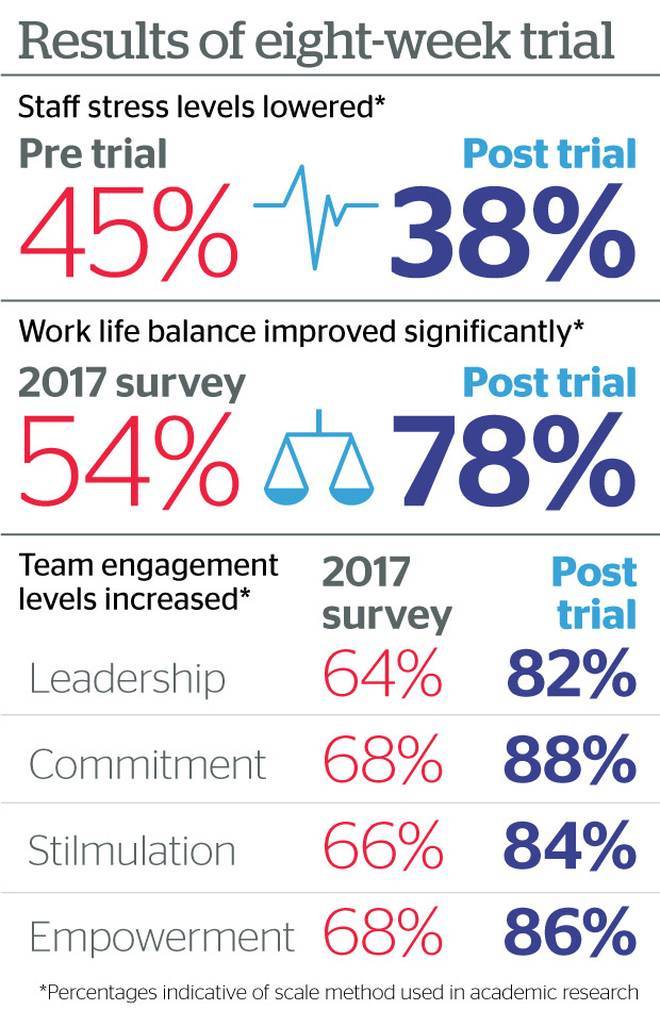
Perpetual Guardian founder Andrew Barnes first introduced the reduced workweek in March to see what impact, if any, it would have on productivity levels at the business.
This initial test was a success, with independent academic research showing productivity levels remaining intact and job satisfaction improving markedly among staff members.
As was the case with the trial, employees who opt into the four-day week will be eligible for a weekly rest day provided they meet their weekly productivity objectives and will be paid their usual salary.
While the new policy comes into effect on November 1, getting it over the line wasn't quite as easy as sending out an all-staff email.
Perpetual Guardian sought legal opinions from Belly Gully and MinterEllisonRuddWatts, who recommended a framework that would ensure the company remained compliant with New Zealand law.
"We actually have to get people to opt into the policy. This will be done on an annual basis, and it has to be done individually; it cannot be done collectively," Barnes tells the Herald.
"At the same time, when they opt in, they have to acknowledge that their working hours remain the normal nine-to-five working hours. They have to acknowledge that these rest days are a gift. They need to be cognisant that there might need to be some flexibility around those rest days."
The complexity arises, says Barnes, because employment laws are still drafted in the language of "hours worked" rather than "productivity".
"The Employment Relations Act, for instance, requires that all employment agreements include agreed hours of work, the days of the week when the work is meant to be completed and the start and finish times of the work.
"This is one of the reasons why we have low productivity in New Zealand.
"We're not focusing on the right thing. We're focusing on the days and therefore the assumption is the days deliver the amount worked, but this doesn't always hold true."
Barnes' novel approach to work has already started an enormous international debate, spread across 32 countries and featuring in the BBC, CNN, the New York Times, the Guardian, The World Economic Forum and others. It's even made its way into popular culture, with comedian Jim Jefferies mentioning the initiative in a segment on what Americans get wrong about work.
"I would've been happy with a short article in the Herald", responds Barnes when asked whether he was surprised by the media response.
But, he doesn't want the debate to end with a few news articles scattered across the globe, saying he'd like to see it provoke changes to employment law to ensure that flexible arrangement, like the four-day-week, can be implemented without the risk of workers relinquishing their rights.
"I do not wish to see the hard-fought protections lost," he says.
"I do not wish to see other employers use the four-day week strategy as a method to reduce working weeks and reduce pay.
"But to change this, we need to have employment legislation that is flexible enough to focus on agreed productivity outcomes and flexible enough to allow workers to have flexible hours, provided they have met the other side of the contract."
Further to this, Barnes takes aim at the gig economy (particularly companies like Uber), which he accuses of offering false flexibility.
"With the gig economy, there's no holiday pay, no sick leave, no contracts, no contribution to superannuation. There's no protection," he says.
"It's a source of great wonderment to me that we are rethinking employment legislation to hold the big tech companies accountable."
"Governments are complicit. They pretend that Uber isn't a taxi company. They pretend that Airbnb isn't a hotel company. And these companies play by different rules ... There is a failure to address this.
"If you do a gig economy, it should cover a payment that goes into superannuation.
"It should cover a payment that goes into a separate account for that individual for sick pay. It should include a payment that goes into that individuals account for holiday pay.
"Because if we don't and that person falls sick and needs to take time out, it's ultimately paid for by the rest of us in taxes and in terms of some type of social security."
Barnes says he has already been approached by international governments to discuss how his policies could be employed more broadly but has not heard anything from the local leadership.
"Organs of the British Government and Australian Governments have reached out, but I have not had one phone call from Wellington," he says.
"This is a global initiative being led out of New Zealand and our Government has done nothing. I find that super frustrating."












